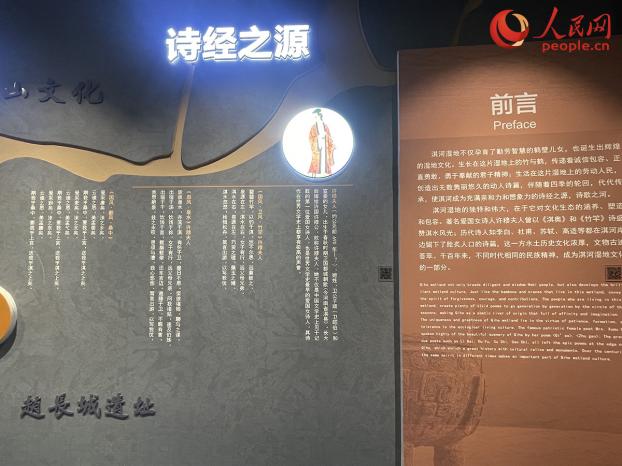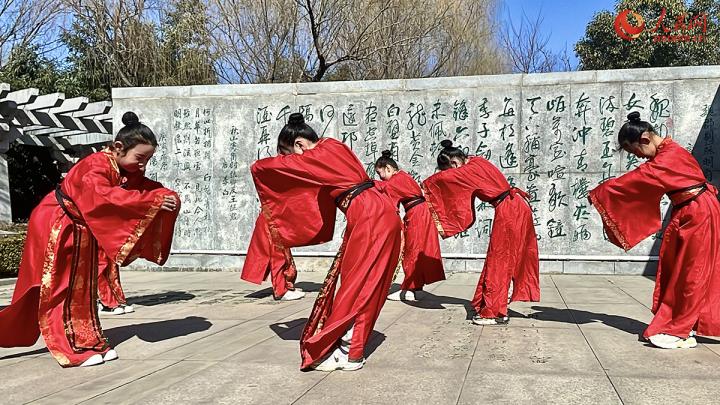Which river is known as "China Poetry River"? What is the fetter with poetry? Recently, the reporter followed "freehand brushwork in China — — Exploring the Origin of Chinese Characters "The interview group came to the bank of Qihe River in Hebi, Henan, and felt the deep ancient and modern poetry.
Time flies, and the stars move. Wandering in the river, there are endless long years flowing. Qihe River, which has come from the depths of history, has left behind poems that have been sung for thousands of years, nourishing one side of the land endlessly.
Poetry has profound cultural connotations.
Qihe River, called Qishui in ancient times, originated in Qizishan, Shanxi Province. After entering Henan, it flows into Weihe River in Qimen, Hebi, with a total length of 176 kilometers and a length of 83 kilometers in Hebi.

Poetry related to Qihe River. People’s Daily reporter Liu Weishe
Since ancient times, many literati have come here to play and watch, and their poems are full of joy. "Qi Shui Tang Tang, gradually draped over the car", "Qi Shui Cui, Ba Ba Song Zhou" and "Looking forward to the Olympics, green bamboo and bamboo" … … In the Book of Songs, the first collection of poems in China, many poems describe the beautiful scenery of Qihe River and record the customs closely related to cross-strait life.
Poets of all ages, such as Li Bai, Gao Shi and Wang Wei, also came to the Qihe River to sing. "Qi water flows like jade, and boats and cars rush every day." Li Bai saw a lot of traffic on both sides of the Qi River, which was very lively; "yiyi Xishan, don’t leave the mulberry forest", Gao Shi came to stay by the Qi River and lived a rural life of self-cultivation and self-sufficiency; "Ping Ju Qi Shui, Dongye Kuang Shan", the Tang Dynasty poet Wang Wei lived in seclusion in a small village, intoxicated by the quiet pastoral scenery.
Ancient rivers are pregnant with ancient poetry culture. In September 2014, the Chinese Poetry Society officially named Qihe River as "China Poetry River", which is also the first river named after poetry in China.
Spontaneous chantingHeritage Classic
Today, thousands of years later, people living here still love poetry and inherit classics. With the theme of poetry, a 2.5-kilometer-long street park was built in qibin district — — Qishui Poetry Garden, with Qihe River as the carrier and poetry corridor as the main line, is divided into five chapters: pre-Qin, Qin and Han, Tang and Song, Ming and Qing Dynasties and modern times from north to south, with a total of 1,500 poems.
Strolling along the Qi River, the water surface is sparkling under the sunlight. No matter on the slate of the poetry corridor or the floor tiles of the square, poems related to the past dynasties are engraved everywhere, and parents can be seen everywhere taking their children to have a rest and recite poems, telling stories related to this place, adding a lot of poetry and painting under the beautiful scenery.

The children are singing poems. People’s Daily reporter Liu Weishe
It is reported that on weekdays, citizens often come here spontaneously to organize poetry readings. On the day of the reporter’s visit, members of Hebi City Recitation Association and students of Futian Primary School in the city performed wonderful recitation programs in Taibai Square. "Vote for me with papaya, with Joan Cheng. It’ s always good to report it. " While bowing, the children sang The Book of Songs Wei Feng Papaya with childish voices.
This city, which is closely connected with poetry, inherits the classics by combining modernity with tradition, and shows the profound cultural elegance of Qihe River Basin.
Protecting ecological damei wetland
Qihe River is Hebi’s mother river and life river. It rushes out from Taihang Mountain, giving birth to the misty Qianhe Lake, the Qiligou with clear water, the mysterious and romantic Jinshan Temple, the ancient Lutai Pavilion and the Qihe National Wetland Park with flocks of birds. In 2015, Qihe Ecological Zone was rated as "National Eco-tourism Demonstration Zone" by the National Tourism Administration and the Ministry of Environmental Protection. In 2021, the Hebi section of Qihe River, as the only river selected in Henan Province, was selected as the nomination case of "Beautiful Rivers and Lakes" by the Ministry of Ecology and Environment.

Qihe national wetland park. People’s Daily reporter Liu Weishe
Following the interview group, the reporter came to Qihe National Wetland Park and saw the reeds rippling by the clear river. "Duck Prophet of Spring River Water Heating", strolling in the garden, many ducks and geese are playing in the water, and peacocks are pacing on the shore. Red-crowned crane, gray crane, white-headed crane and gray-crowned crane … … In Heyuan, there are many rare cranes walking leisurely. According to the on-site commentator, there are 8 kinds of cranes in Heyuan, and there are more than 200 other birds. "Come to Hebi to see cranes" has become a new business card being built locally.
It is understood that Qihe National Wetland Park has a total area of 4,987 mu, of which the wetland area is 4,065 mu, and the wetland rate is 81.43%. The wetland park has diverse geological terrain, rich hot spring resources and good water quality, which provides an ideal growth environment for animals and plants.
"Lucid waters and lush mountains are invaluable assets", it is reported that the local investment is nearly 400 million yuan to build water conservation forests, build ecological buffer zones and isolation zones, build ecological wetlands to restore rivers, and build an ecological protection circle of Qihe River, which combines arbor, shrub, grass, vine and humidity, and reproduces the Dameiqi River from the Book of Songs.
关于作者